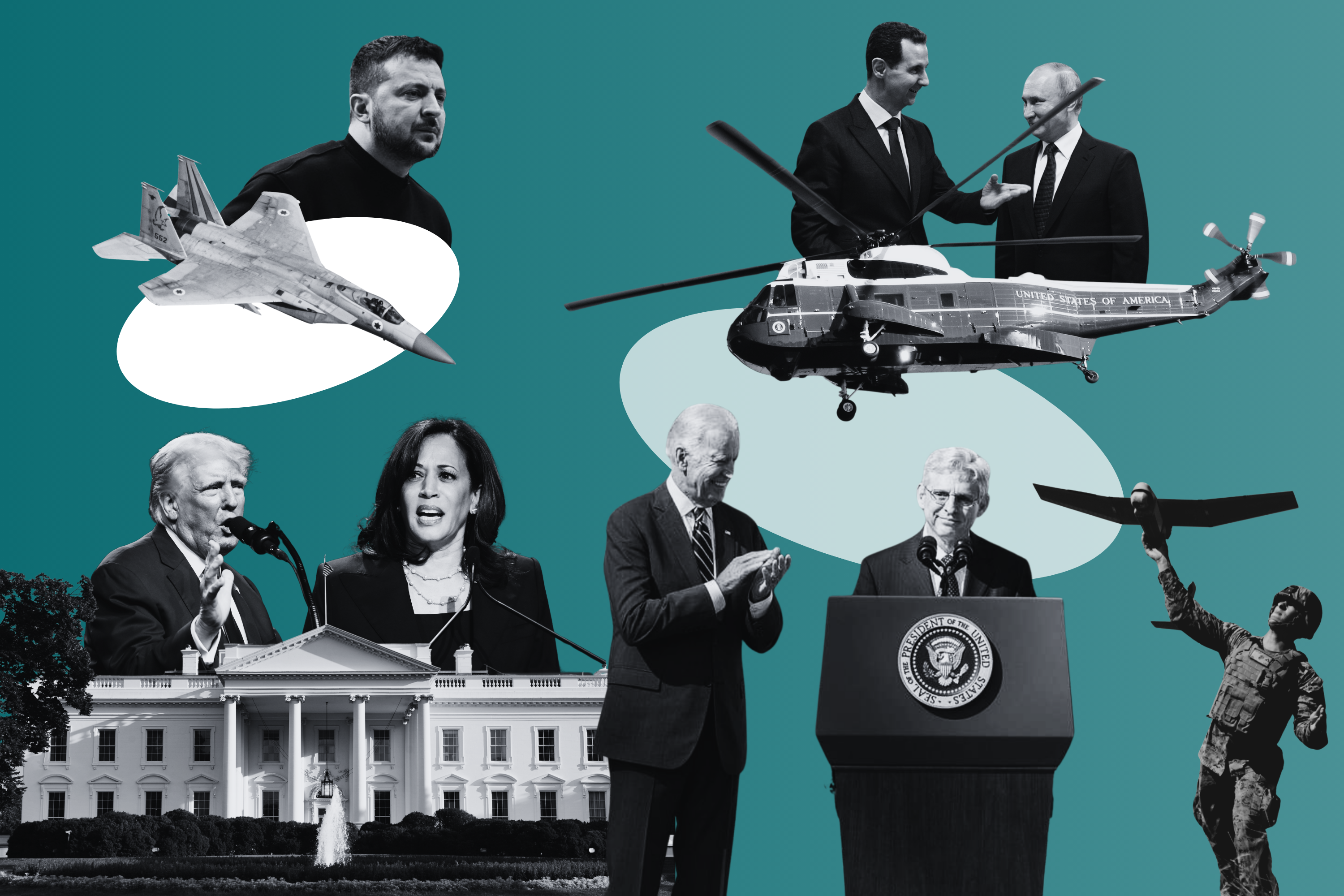Today's Headlines and Commentary
American intelligence agencies have reached a consensus of “high confidence” that Russia was in fact behind the hacking of 20,000 DNC emails, according to The New York Times. The hack could have been part of “routine cyberespionage ...
Published by The Lawfare Institute
in Cooperation With

American intelligence agencies have reached a consensus of “high confidence” that Russia was in fact behind the hacking of 20,000 DNC emails, according to The New York Times. The hack could have been part of “routine cyberespionage ... of the kind the United States also conducts” or an effort to manipulate the Clinton campaign and the 2016 election, though intelligence officials are still uncertain as to which motive was behind the leak. The Times quotes Lawfare's own Susan Hennessey on the "smoking gun" of Russia's involvement, evidence of which is clear "as can be expected when a sophisticated nation-state is involved.”
The founder of WikiLeaks, Julian Assange, stated that he hoped suspicions of Russian involvement would raise “a very serious question” about Hillary Clinton’s “natural instinct” to blame foreign governments when confronted with a “serious domestic political scandal.” Assange refused to give up any of WikiLeaks’ sources,
The Democratic National Committee first noticed evidence of hacking in the spring of 2016, which was determined to be from the hacking group APT 28 (or “Fancy Bear”) which is believed to be run by Russia’s military intelligence agency, and later found a “better-hidden infiltrator” known as APT 29 (or “Cozy Bear”), which is linked to F.S.B. “the main successor to the K.G.B.” Cozy Bear had complete access to the DNC’s systems for just short of a year. Both APT 28 and APT 29 have strong links to Russia, which the New York Times explains here.
President Obama has said it is possible that the Russians are behind the email leaks, citing Republican presidential nominee Donald Trump’s “expressed admiration for Vladimir Putin” as motive for the apparent Russian attempt to undermine the DNC.
Earlier today, militants killed at least 14 people in three separate attacks in and around Baghdad. No group has claimed responsibility for the attack, but it bears “the hallmarks of the Islamic State group,” according to the Associated Press. Local authorities acting independently of the central government in Baghdad are now pushing measures to limit militant attacks, with a provincial council in Babil deciding to allow “authorities to demolish homes of convicted militants and banish their families from the province” and requesting that Baghdad turn over militants responsible for attacks on their province for execution. This is the first decision of its kind since 2003.
“Today there is no way at all to bring anything into Aleppo,” the director of the Syrian Observatory for Human Rights said today after the Syrian army announced they had cut all supply routes into eastern Aleppo. The government air-dropped leaflets asking for cooperation while also calling for fighters to surrender, while the U.N. aid chief asked Monday for weekly 48-hour pauses in fighting in order for food and aid deliveries. Reuters has more.
A truck bomb killed nearly 50 people in the predominately Kurdish town of Qamishli, Syria. The attack, which has been claimed by ISIS, appears to have targeted local Kurdish police. Al Jazeera has more.
The US military has begun a formal investigation of reports that US-led coalition airstrikes in Syria killed over 50 civilians last week. The attack would be the single deadliest incident of coalition airstrikes against civilians in the anti-ISIS campaign so far.
Amidst a violent and hectic year, the New York Times urges us to slow down and consider “The Human Toll of Terror.” The photo project examines all 247 victims of terror attacks over the course of two weeks in March 2016, putting faces to names and numbers.
Balkan Insight features a project on the “Euro arms pipeline to the Middle East,” tracking weapons from Central and Eastern Europe as they move into Saudi Arabia, Jordan, United Arab Emirates and Turkey. Through tracking flight records, weapons contracts and arms export data, the reporters value this “almost certainly illegal” arms trade at 1.2 billion Euros--or even higher.
Turkey continues to clamp down on suspects and supporters of the failed military coup, ordering the detention of another 47 journalists. So far over 15,000 people have been detained, of whom more than half have been formally arrested. Pennsylvania-based cleric Fethullah Gulen, accused of masterminding the coup, has continued to deny an involvement. Reuters has the latest here.
Earlier today, Spanish officials arrested and charged two Moroccan brothers with financing terrorism, collaboration with a terrorist group, and indoctrination, Reuters reports. The case is the first in which Spanish authorities have uncovered clear evidence of money transfers to ISIS from within Europe.
Morocco has arrested 52 suspected ISIS-inspired militants, who may have been planning to create an ISIS outpost in Morocco and assassinate security and military officers as well as tourists. Reuters has more here.
German authorities said the 18-year old Iranian-German shooter behind the Munich mass shooting last Friday likely bought his gun on the darknet marketplace — a term for the back alleys of the Internet where most contraband can be purchased. Propaganda channels for the Islamic State frequently recommend Tor, a popular arm of the “dark web,” to its group’s followers. The Wall Street Journal has more.
The AP gives us more details on the attack on a Catholic church in Normandy by two ISIS-inspired young men. The two attackers forced hostages to record them on a mobile phone as they slit the throat of the priest during mass. Religious leaders in France urged the country to remain unified and not “set children of the same family upon each other.”
The New York Times adds that one of the attackers had been detained for nearly 10 months after twice trying to travel to Syria, but was released in March over prosecutors' objections. The Islamic State released a statement referring to both attackers as “soldiers.”
France’s President Francois Hollande met with leading religious figures from the country’s Jewish, Muslim, Christian, and Buddhist communities, stressing that the country must not lapse into a “war of religions” mindset. But Nicolas Sarkozy, Hollande’s predecessor and a likely political opponent in next year’s presidential election, said the government has not gone far enough to track down ISIS sympathizers. Sarkozy called for the detention or electronic tagging of all suspected militants, even before the individuals in question commit any offenses.
Reuters reports that Russian Defense Minister Sergei Shoigu announced on Russian state television that Russia has strengthened its southwestern flank in Ukraine. Shoigu also said Moscow would deploy more air defense systems in the southwest and maintain a “self-sufficient” contingent of troops in Crimea, even as NATO builds up its military presence near the Ukrainian border.
In the wake of Brazil’s recent high-profile arrests of ISIS-inspired plotters, the Washington Post writes that Brazil holds a “pre-9/11 notion of security” and may not be properly equipped to detect and prevent complex terrorism plots. Not only does the country have no real experience with international terrorism, but its security forces are still developing basic counterterrorism protocols just two weeks before the Olympics begin.
The Associated Press relays U.N. Secretary-General Ban Ki Moon’s request to all warring parties across the globe to put aside differences during the upcoming Olympic Games in Rio de Janeiro. The U.N. chief said in a video posted on Twitter that the International Olympics Committee and the United Nations work closely together for “global harmony and peace.”
U.S. Secretary of State John Kerry said Beijing must recognize an international tribunal’s ruling against its broad claims in the South China Sea if China commences bilateral negotiations with the Philippines. Speaking while he was in the Philippines, Kerry echoed Manila’s assertion that any talks over the contested waters must begin with the tribunal’s ruling as their basis. China maintains that the international arbitration panel was illegitimate and lacked jurisdiction. The Wall Street Journal has more.
Chinese Foreign Minister Wang Yi accused the United States, Japan and Australia of “fanning the flames” of regional tensions after the three nations issued a joint statement encouraging both the Philippines and China to abide by the Arbitral Tribunal’s Award of July 12. The foreign ministers of the United States, Japan, and Australia drafted this statement after meeting on the sidelines of a recent regional security conference in Laos.
Richard Fontaine notes in The Diplomat that a U.S. Navy warship will visit New Zealand in November, marking the end of a three-decade long period of security estrangement between the two nations. This reversal comes as policymakers in Wellington grow increasingly concerned over volatility in the South China Sea. The breach in bilateral ties dates to 1984, when New Zealand’s government banned port visits by any nuclear-armed or powered vessels--effectively closing New Zealand to the US Navy, given the U.S. military’s longstanding policy of neither confirming nor denying the presence of nuclear arms on its ships.
In an editorial in the Financial Times, Senator John McCain (R-AZ) calls for the United States to deepen its partnership with Pakistan. Senator McCain argues that the U.S. mission in Afghanistan will be in jeopardy if Washington’s relationship with Islamabad does not improve, noting that U.S. and Pakistani interests converge on issues such as counterterrorism, nuclear nonproliferation, and regional stability.
The Associated Press reports that South Sudanese soldiers raped dozens of ethnic Nuer women and girls last week just outside of a United Nations camp where they had sought protection from renewed fighting. At least two victims died from their injuries. The rapes in the capital of Juba underscored two serious problems as the country threatens to descend into another civil war: targeted ethnic violence and the reluctance by UN peacekeepers to protect civilians. According to the Protection Cluster, a group of aid workers that monitors violence against civilians in South Sudan, over 1,300 women and girls were raped last year by government forces and allied militia in oil-rich Unity state.
ICYMI: Yesterday, on Lawfare
David Ryan continued Lawfare’s coverage of the ongoing trials at Guantanamo Bay with a report on Thursday’s proceedings.
Jack Goldsmith and Matt Waxman flagged a piece they wrote for the Washington Quarterly evaluating the legal consequences of President Barack Obama’s preference for stealthy and long-distance warfare.
Jack also compiled a tweetstorm he wrote with his thoughts on Russia’s alleged hack of the DNC’s email system.
Email the Roundup Team noteworthy law and security-related articles to include, and follow us on Twitter and Facebook for additional commentary on these issues. Sign up to receive Lawfare in your inbox. Visit our Events Calendar to learn about upcoming national security events, and check out relevant job openings on our Job Board.






